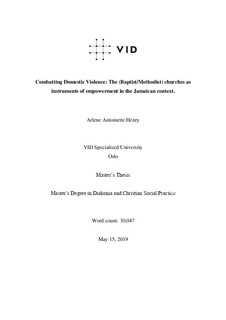Combatting domestic violence: The (Baptist/Methodist) churches as instruments of empowerment in the Jamaican context.
Master thesis
Permanent lenke
http://hdl.handle.net/11250/2617971Utgivelsesdato
2019Metadata
Vis full innførselSamlinger
Sammendrag
Described as a global emergency, the issue of domestic violence (DV) is a stark reality that affects millions of women, men and children. In recent years one can almost say that use of the word domestic violence has been replaced by the term intimate partner violence (IPV), the most prevalent form of domestic violence. This study aims to answer the question “What are the (Baptist and Methodist) churches in Jamaica doing to help combat domestic violence and empower victims?”. The research explores the nature and impacts of IPV, looking at those who provide care and support and more importantly an overview of how the churches can be instruments in combatting DV and empowering victims.
This thesis through the lenses of three theories – ecclesiology and gender, power and social dominance, as well as empowerment through diakonia, explores how churches are responding to victims of DV/IPV in the Jamaican context. The research was conducted with the help of interviews with 16 participants; Baptist and Methodist church leaders, leaders of organisations related to DV, as well as victims. During the study a very pertinent and relevant resource was shared which proved to be very insightful in this research. That of the Women’s Health Survey 2016, which was published in June 2018, which surveys IPV in Jamaica.
The study revealed that while the Baptist and Methodist churches acknowledge the demeaning nature of DV/IPV as well as its prevalence and severity in Jamaica, with one in four women being affected, they also confess to not adequately fulfilling their ecclesiological role in providing care and support to victims. Through the voices of leaders of organisations and victims the research revealed that churches in Jamaica are not visible in the task of combatting DV/IPV. The participants highlighted several initiatives and programmes they believed could aid the church in their response. During the research it was revealed that the combat of DV might be best served if civil society and the church partner in combatting DV by stemming IPV.
